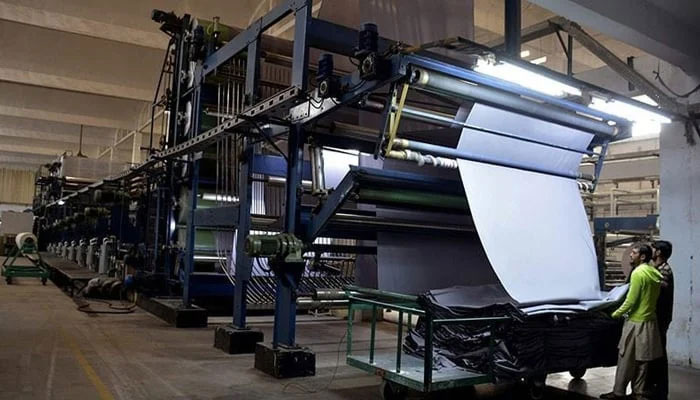APTMA leaders call IMF package ‘catalyst’ for economic reform
LAHORE: The All Pakistan Textile Mills Association’s (APTMA) Patron-in-Chief Gohar Ejaz described the IMF package as an opportunity for Pakistan to implement institutional reforms and significantly reduce electricity tariffs and interest rates at a press conference at the APTMA House, Lahore.
During the event, Ejaz and members from along with the newly elected Punjab body said that increasing exports is key to tackling poverty, unemployment and inflation.Gohar, while congratulating the newly elected officials of APTMA, noted that the inflation rate has been controlled and we have reached ground zero. “Now, we have to take off from here. Our textile industry has the capacity to generate $36 billion annually, and we must ensure the provision of electricity at nine cents at all costs,” he said.
Chairperson of APTMA Punjab Kamran Arshad added that the IMF programme is likely to be beneficial for economic recovery. “If given facilitation, the APTMA will bring foreign exchange into the country.” APTMA leaders congratulated the army chief and the prime minister for securing the IMF programme, asserting that industries should operate, not shut down. “The next three years will be years of development for Pakistan.” APTMA leaders highlighted that textile exports currently stand at $16 billion, with $10 billion coming from APTMA members. They revealed that 80 per cent of value-added products fall within textiles, adding that if garments and fabrics are produced from exported yarn, an additional $10 billion in exports could be achieved. They claimed that exports could reach $30-36 billion annually if electricity rates are reduced to nine cents. They also called for further reductions in interest rates and urged independent power producers (IPPs) to forgo capacity charges.
The leaders said that exports could increase by $6 billion, potentially reaching $36 billion in a single year, helping the country eliminate costly short-term foreign loans. Gohar also supported the army chief’s remarks about the need to curb theft. Finally, he stressed the importance of systemic reforms and corrections to the economic agenda to ensure sustainable growth.
-
 King Charles Takes A Major Step To Keep Horrified Prince William Out Of The Loop On Andrew: Insider
King Charles Takes A Major Step To Keep Horrified Prince William Out Of The Loop On Andrew: Insider -
 Taylor Swift Set To Make Biggest Cut From Her Wedding Guest: Blake Lively Or Ryan Reynolds
Taylor Swift Set To Make Biggest Cut From Her Wedding Guest: Blake Lively Or Ryan Reynolds -
 Prince William Meets Saudi Crown Prince Mohammed Bin Salman
Prince William Meets Saudi Crown Prince Mohammed Bin Salman -
 Brooklyn Beckham Brutally Cuts Off Inner Circle Amid Feud With David, Victoria
Brooklyn Beckham Brutally Cuts Off Inner Circle Amid Feud With David, Victoria -
 Kaley Cuoco Reveals Why Fiance Tom Pelphrey Sleeps In Seperate Room
Kaley Cuoco Reveals Why Fiance Tom Pelphrey Sleeps In Seperate Room -
 Ghislaine Maxwell Will Not Answer Congress Questions On Epstein
Ghislaine Maxwell Will Not Answer Congress Questions On Epstein -
 Kensington Palace Announces Prince William's Arrival In Saudi Arabia
Kensington Palace Announces Prince William's Arrival In Saudi Arabia -
 ‘Andrew Crisis Follows King Charles Everywhere Now’
‘Andrew Crisis Follows King Charles Everywhere Now’ -
 Jennifer Aniston Already Decided Her Wedding Dress?
Jennifer Aniston Already Decided Her Wedding Dress? -
 Prince Harry, Meghan’s Hollywood Party Drama Exposes Chaotic PR Strategy
Prince Harry, Meghan’s Hollywood Party Drama Exposes Chaotic PR Strategy -
 Jennifer Garner Reacts To Savannah Guthrie's Video As Search For Nancy Guthrie Continues
Jennifer Garner Reacts To Savannah Guthrie's Video As Search For Nancy Guthrie Continues -
 Bad Bunny Leaves Fans Worried With Major Move After Super Bowl Halftime Show
Bad Bunny Leaves Fans Worried With Major Move After Super Bowl Halftime Show -
 Captain Jason Talks Personal Hardships He Faced Ahead Of 'Below Deck' Season 4
Captain Jason Talks Personal Hardships He Faced Ahead Of 'Below Deck' Season 4 -
 Anti-monarchy Group Reacts To Prince William, Kate Middleton Statement On Epstein Scandal
Anti-monarchy Group Reacts To Prince William, Kate Middleton Statement On Epstein Scandal -
 Andrew 'must' Apologize Not Wider Royal Family For Jeffrey Epstein Links
Andrew 'must' Apologize Not Wider Royal Family For Jeffrey Epstein Links -
 Super Bowl 2026: Why Didn't Epstein Survivors Ad Air On TV?
Super Bowl 2026: Why Didn't Epstein Survivors Ad Air On TV?




